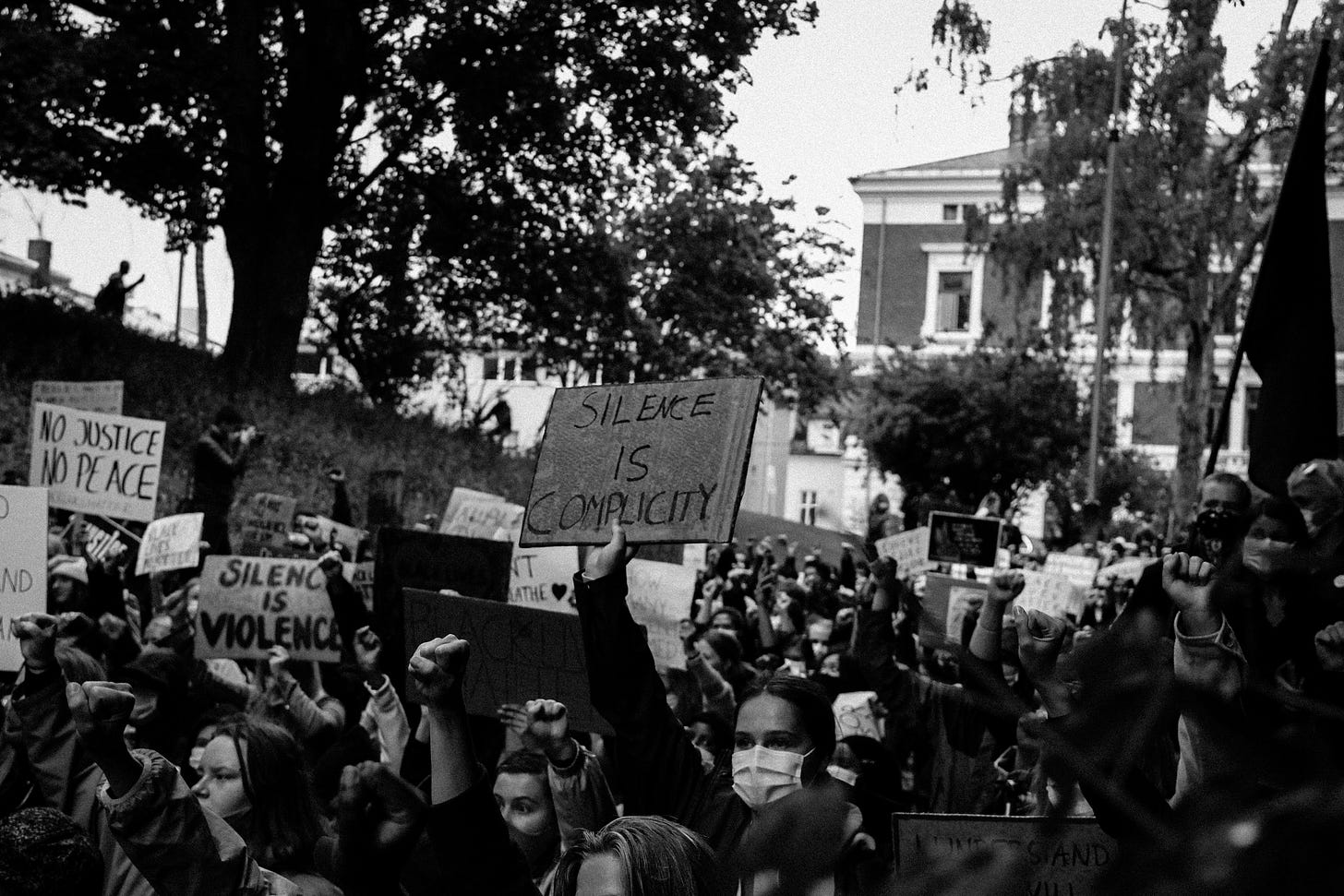A word after a word after a word is power.
On overcoming speechlessness.
I spend most of my time in silence now. There is enough going on to brim the edge of my day and spill over to the next (and the next (and the next)). Sometimes I sit in cafes to write, get lost in the chit-chat-chair-scrape-steam-scream-wet-winter lilt. Sip my coffee. Count my pulse. Say please, thank you. Nothing more. I leave when the lilt is louder in my brain.
.
How ugly it is to try. To truly, truly try. There is nothing more hideous than trying, except, perhaps, not really trying at all, and I am learning this the hard way.
.
Silence is unforgivable, and yet it is from silence that all is born. Our days are punctuated by rests, crescendos, harmonies, rubatos, codas. I learn that rubato means “stolen time” in Italian; temporal deviation; emotional indulgence; shaping. It lends itself to rubatosis, a word coined for the sudden, unnerving awareness of one’s own heartbeat. Isn’t it ironic that to be unnerved is also to be disheartened, that the heart’s presence precipitates its absence?
But then, how else could it be?
.
In the wake of carnage, I have found myself speechless. So, I share what others are brave enough to say. I share stories of the people in Gaza—crying, dying, dead. I wince at the war on my screen and find my tongue swollen, numb. I let others speak; for themselves, but also for me. A man messages me and it’s clear he only means to be cruel; that he takes pleasure in my denigration. Just because you share doesn’t mean anything, he says. And I balk at this because how else do we learn except by sharing each other’s truths? I know the answer, though, and so does he: How about you actually engage in these topics? And I honestly do. I do when I cry over the bones of a malnourished baby seconds after I wake. I do when I ruin family dinners, doggedly broaching our collective inertia and making everyone uncomfortable. And I do when I make myself quiet and allow others to speak…don’t I?
.
It’s late and the party’s over and I sit on my little sister’s bed with my mum and my god mum and I cry and I cry and I cry. I want to help people, I choke out. My mumlooks at me and for the first time in my life, I cannot name the look in her eyes. I tell them my dreams feel too big. Too hard. Meant for someone else. Not for me. And beneath the self-doubt and anger and passion and fatigue, a bigger truth bubbles to the surface: I’m afraid. They hold me close, make me laugh. Comfort me in the way only mothers can.
.
Stepping further into my presence as a writer has made me…quiet. I am suddenly very aware that my words have power, and with that power, consequence. My instinct is self-preservation. I am privileged in many ways, but I am still a queer mixed woman with too much to say. I’ve coddled myself into a false sense of security by swallowing my words and letting them catch in my throat—and worse still, I am so familiar with the weight on my vocal cords that I forget I was the one who put them there. How foolish. But that’s how oppression works, isn’t it? It’s insidious. Unnerving. It helps you tie the double knot on your own gag and lets you choke.
says “A word after a word after a word is power”1 and god damn it I can’t afford to concede the only real power I know how to wield. I dream of change like it’s a task in my diary, but change—revolution—is not defined by singular acts, but collective, unyielding movements. So when I do not speak, when I do not act, I am not making room for others: I am dulling the chorus. My inaction is complicity. My silence is self-censorship. And when I treat space as a limited resource, not the boundless, infinitely complex entity that it really is, I become implicated in my own oppression and I lead by that example..
Our world is growing so full of hate that I’m convinced a hard and uncompromising love is the only way forward. Because our love counts for nothing if it cannot be heard, cannot be seen, cannot be felt. If it’s bound by borders and biases. If it has strings attached. And hate, left to metastasise in the void of our silence, will not thank us for offering it space to grow. Nor will it remember our ignorance when it eventually meets each of our eyes. And I know that to love deeply and openly is scary because I am scared, but I confess, as Audre Lorde once did, to a timeless and bitter truth:
“My silences (have) not protected me. Your silence will not protect you.”2
And so I remind you:
It is a privilege to only be disturbed by videos of rotting babies, severed limbs, and shredded corpses.
To only imagine your home stolen, bombed, or gutted.
To only witness forced starvation and famine.
To only hear stories of rape being used as a weapon of war.
To only be inconvenienced by the aftermath of devastation.
It is a privilege to be able to advocate for the safety, dignity, and humanity of others with little or no consequence—that is power.
It is a privilege, simply, to be alive.
.
We are all here on stolen time and by that I mean we shape this world by virtue of our existence. Listen. Do you hear it? The way your heart beats against your ribs? The silence in b e t w e e n? Can you feel it? The vessel bounding beneath the angle of your jaw? The absence before the pulse? The absence before the pulse? The absence before the pulse? The absence before the pulse?
The absence Say something.

I know this will not sit comfortably with many. Before commenting, remember: you get to decide how you confront injustice in your life, and your safety, security, and personal circumstances are allowed to shape your decisions. However. I urge you to, at the very least, reflect on your silences and see how, in even the smallest way possible, you can be a voice for change—how you can stretch your love. Change doesn’t start in parliaments or even in the streets. It starts at home, at work, out with friends, online, and in the community. It starts with you.
Emerging from a season of deep rumination,
Caitlin x
Your support keeps Ruminations running & this writer at her desk <3
You might also like:
Why can't you meet your own gaze?
There comes a point where we must face ourselves.
Stare down the barrel of a gun reflected in a bulletproof mirror.
Meet our own eye.
Just another person(a) online
When I think about who I’d like to be online, the answer isn’t ‘myself’.
Atwood, M. (1981). Spelling.
Lorde, A. (1978). The transformation of silence into language and action.






Caitlin what a true talent. I feel how you feel, from far away. My home country is not foreign to hatred-fueled loss and we’re standing in solidarity with the world right now and the horrid things that happen before our eyes.
More than anything, I know what it’s like feeling like being an artist is like being a speck of dust in a world that could only be saved by a superhero, a great donor, a doctor. We wish we were that too, don’t we? But your word is your weapon, keep writing.
god i’ve been sitting with this since yesterday and wondering what to say. you have a wondrously powerful way of sharing your thoughts and you’ve put into words the way i’ve been feeling as well.